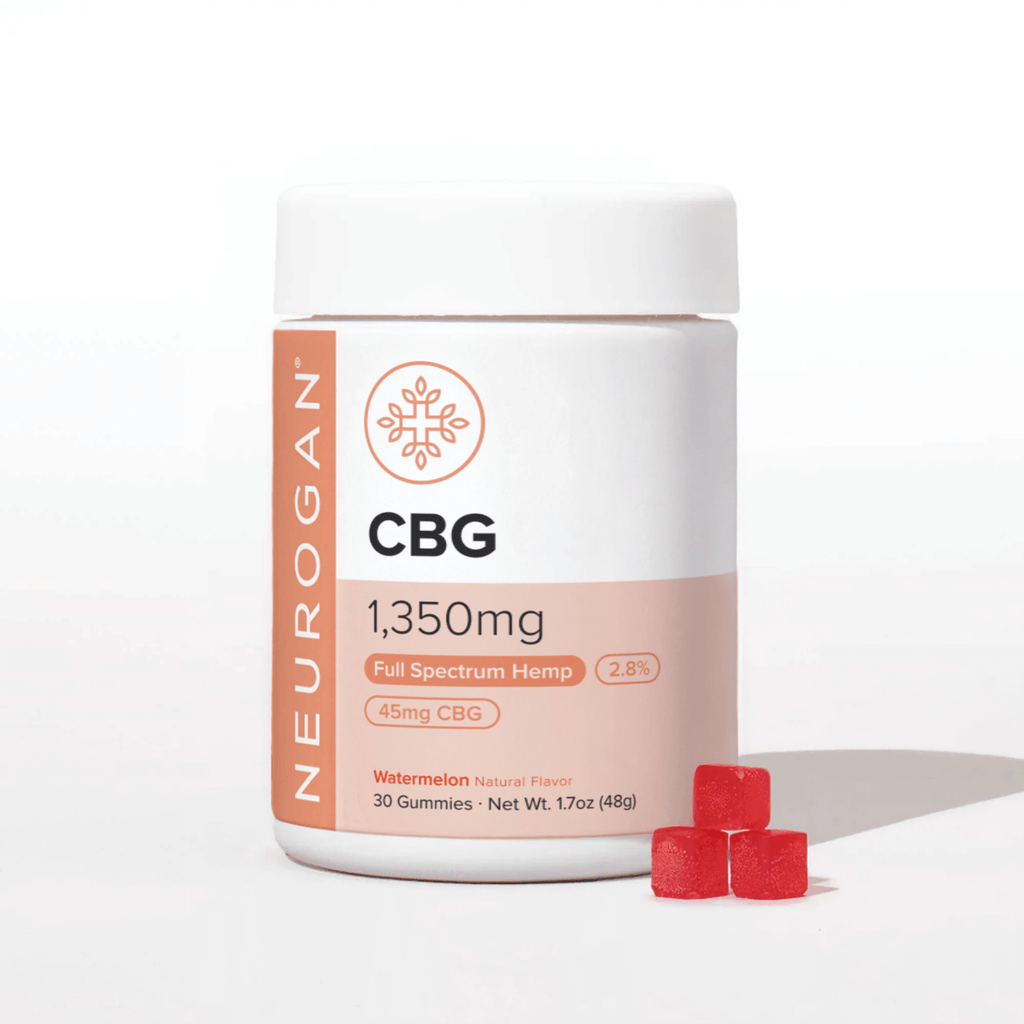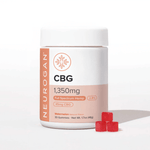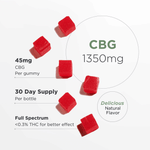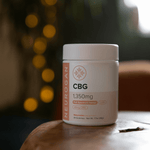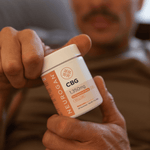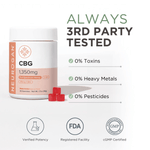CBG stands for cannabigerol, a non-psychoactive cannabinoid derived from the cannabis plant. Known as the parent or mother of cannabinoids, CBG's precursor, cannabigerolic acid, evolves into other cannabinoids, like THC and CBD, as the plant matures. CBG interacts with endocannabinoid receptors in the human body, contributing to homeostasis.
Cannabigerol (CBG)is a minor cannabinoid, which means it doesn't exist naturally in very large quantities naturally in cannabis plants. It's not as well-known as CBD or THC, but CBG has become a popular cannabinoid in the health and wellness space due to similarities & legalization of hemp like CBD.
As the precursor molecule to CBD and THC, it has very similar effects, especially regarding immune health. CBG works by binding to endocannabinoid receptors in the human body to support homeostasis.
It's nicknamed the parent cannabinoid or mother of cannabinoids because its natural form, cannabigerolic acid, transforms into tetrahydrocannabinolic acid (THCA) cannabidiolic acid (CBDA) as the plant matures.
What is CBG in Medical Terms?
You may have heard of “CBG” in other contexts. In the medical field, CBG can refer to a few different things:
-
Capillary Blood Glucose: A measurement of the concentration of glucose in the blood.
-
Capillary Blood Gas: A blood test that measures gas levels and acid-base balance in the blood.
- Corticosteroid-Binding Globulin: A protein that carries glucocorticoids in blood.
In the context of cannabis, CBG stands for cannabigerol, a non-intoxicating cannabinoid found in cannabis plants, present along with over 100 other cannabinoids like CBD, THC, CBN, and CBC.

CBG interacts with the body’s endocannabinoid system (ECS), which regulates mood, inflammation, appetite, and sleep. One of the most talked-about effects of CBG is its potential to elevate mood and promote a sense of well-being.
CBG has also been studied for its neuroprotective and anti-inflammatory properties, which may improve brain health, support normal stress response, and improve mental clarity [1].
What are the Different Ways to Take CBG?
Like CBD and THC, CBG comes in several formulations and applications. Each of them offers a unique experience depending on how it’s absorbed and how quickly it takes effect. Below, we’ll break down the most common ways to take CBG and what to expect from each one.
What Is CBG Oil?
CBG oil contains concentrated CBG extract from hemp mixed with a carrier oil like MCT oil, olive oil, hemp seed oil, or glycerin, to create the final product. It’s made with either:
- A CBG-rich, full spectrum hemp extract, containing a range of beneficial cannabinoids, terpenes, and flavonoids, including trace amounts of THC (under 0.3%).
- A CBG-rich, broad spectrum hemp extract, containing a range of beneficial cannabinoids, terpenes, and flavonoids from the hemp plant. All traces of THC have been removed.
- A CBG isolate which is up to 99% pure CBG — no other cannabinoids, terpenes, or flavonoids.
In the same way that full spectrum hemp products produce more potent effects than CBD isolate-based products, CBG in full spectrum form is the holy grail of CBG oils. This is because of a phenomenon called the entourage effect. Plant compounds will yield greater health effects in combination with complementary compounds.

Full spectrum CBG oil can provide holistic support for a balanced mood, concentration, and relaxation. Placing a few drops under their tongue or in a smoothie is a convenient way to include this supplement in your daily routine. You may feel the effects of CBG oil more quickly than with other methods because it's absorbed directly through the mucous membranes in the mouth.
What Is CBG Isolate?
Cannabigerol (CBG) isolate is a white crystalline powder made up of 99% pure CBG. It's odorless and tasteless, making it easy to mix into food or beverages. Many people choose it to experience the effects of CBG alone, especially if they're sensitive to compounds like CBD or THC.
Hemp businesses may also purchase CBG isolate powder in bulk, so that they can measure and add precise doses of CBG to their products.
What Are CBG Gummies?
Hemp gummies or CBG edibles are tasty chews that deliver the benefits of CBG in an easy-to-eat candy. Gummies are made by combining a setting agent like pectin with a CBG isolate, full spectrum, or broad spectrum extract.
They’re a tasty way to support concentration levels throughout the day. They are easy to pop in your mouth on the go, and can provide convenient pre-measured doses of CBG.
As CBG gummies are absorbed through the digestive system first, it may take longer for the effects of CBG to set in, however, they may be more long-lasting than other methods.
What Is CBG Flower?
CBG flowers are hemp flowers, or buds picked before the hemp plant fully matures.
As CBG is naturally more available in younger hemp plants, flowers from the hemp plant will be picked earlier in the flowering stage, around six weeks, before it converts into other cannabinoids. Breeders may also choose to breed specific strains of hemp that retain more CBG.
Like other cannabinoids, CBG can be found in hemp’s trichomes, located mainly on the buds of the plant. CBG buds can be ground up and smoked or vaporized, similar to marijuana.
What Is CBG in Weed Gummies?
CBG is a natural compound that can be found in low quantities in fully grown cannabis plants used to make gummies, including both marijuana or “weed” and hemp strains.
Marijuana edibles like brownies, chocolates, or gummies are notorious for giving people a strong “high.” This is due to the cannabinoid, Tetrahydrocannabinol (THC), which is the main psychoactive substance found in cannabis.
So you may be wondering, "Will CBG get me high?"
CBG can be found in weed gummies, but most likely only in trace amounts. CBG, like CBD, is considered a non-psychoactive cannabinoid. This means that because of the way CBG interacts with our bodily receptors, it won’t produce a “high” or any feelings of intoxication.
As for the role of CBG in edibles, some cannabis enthusiasts say that CBG may buffer THC’s intoxicating effects and may even help alleviate the feelings of anxiousness and paranoia. Limited research suggests this could be from CBG’s interaction with CB1 receptors in the brain.
What Makes a Good CBG Product?
As the CBD market grows, it's important to understand what makes a good CBG product. Not only is a bad hemp product a waste of money, but some scam products on the market could be dangerous — they may contain contaminants that may cause irritation and more severe negative reactions.
A good CBG product has the following qualities:
- Comes from organic, American-grown hemp for legal compliance and quality hemp sourcing
- CO2 extracted to reduce the chances of contamination and impurities in the final product
- Third-party tested to prove that it's free from harmful contaminants and contains the advertised CBG potency
- Medium-to-high potency CBG: Cannabis products should list how many mg of the active compounds are in the product. It would be best if you aimed to achieve at least 20MG of CBG per dose to start feeling the effects of CBG — anything less than this may not have substantial effects on your system
How is CBG Compared to THC?

Similarities of CBG and THC
- Both are known to stimulate appetite
- Interact with the endocannabinoid system to support pain perception, mood, stress, and overall well-being.
- Derived from the cannabis plant
- Not FDA-approved to treat any conditions
- Available in full-spectrum and isolate forms
FAQs
Is CBG Synthetic?
No, CBG (cannabigerol) is not synthetic — it’s a naturally occurring cannabinoid found in the cannabis plant. That said, synthetic versions of cannabinoids do exist, but CBG isolate used in reputable products is typically derived from natural hemp, not made in a lab.
Is CBG Legal?
Yes, cannabigerol (CBG) is legal. With the 2018 Farm Bill passing, hemp plants (cannabis plants with less than 0.3% THC) and their constituents, including CBG, were legalized for sale and production.
Is CBG Safe?
CBG is generally safe and well-tolerated, even in high doses. However, some people may be sensitive to CBG and may experience side effects like nausea, dizziness, and an upset stomach.
Resources
-
Gugliandolo, A., Pollastro, F., Grassi, G., Bramanti, P., & Mazzon, E. (2018). In vitro model of neuroinflammation: efficacy of cannabigerol, a non-psychoactive cannabinoid. International Journal of Molecular Sciences, 19(7), 1992
-
Järvinen, T., Pate, D. W., & Laine, K. (2002). Cannabinoids in the treatment of glaucoma. Pharmacology & Therapeutics, 95(2), 203-220.
-
Borrelli, F., Pagano, E., Romano, B., Panzera, S., Maiello, F., Coppola, D., ... & Izzo, A. A. (2014). Colon carcinogenesis is inhibited by the TRPM8 antagonist cannabigerol, a Cannabis-derived non-psychotropic cannabinoid. Carcinogenesis, 35(12), 2787-2797.
Disclaimer: The statements made regarding these products have not been evaluated by the Food and Drug Administration. These products are not intended to diagnose, treat, cure, or prevent any disease. All information presented here is not meant as a substitute for or alternative to information from health care practitioners. Please consult your health care professional about potential interactions or other possible complications before using any product.



